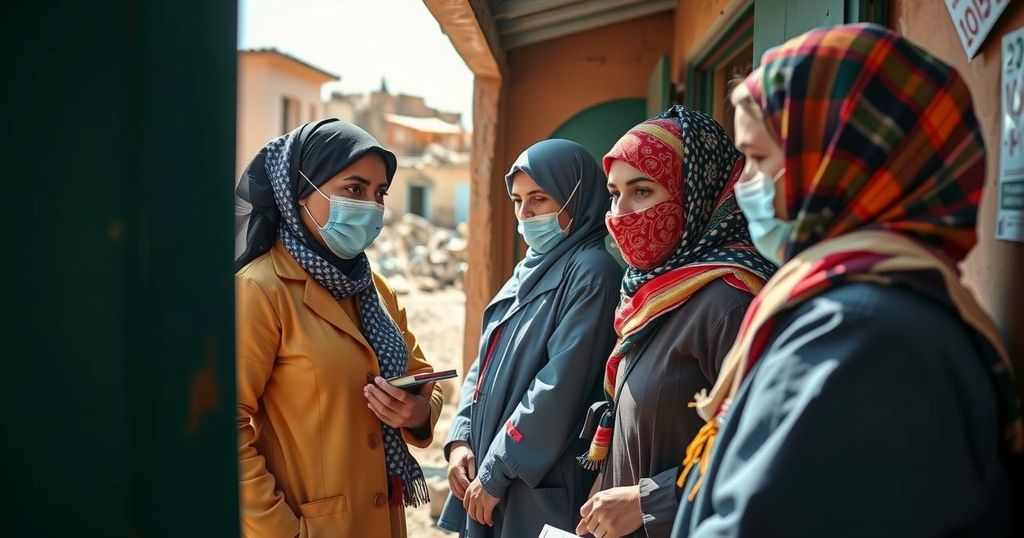In September 2023, Morocco experienced a devastating earthquake that resulted in extensive casualties and damage, particularly affecting vulnerable populations, including pregnant women. Midwives from the Association Marocaine des Sages-Femmes, supported by the International Confederation of Midwives, mobilized to deliver critical healthcare services through mobile clinics in affected areas. They provided medical consultations, psychological support, and distributed essential supplies while also coordinating advanced care referrals. As a result of these efforts, they are also focusing on future preparedness through training programs to enhance their response capabilities in crises.
In September 2023, Morocco was devastated by a catastrophic earthquake measuring 6.8 in magnitude, inflicting substantial destruction, particularly within the rural communities of the Atlas Mountains. The disaster resulted in the tragic loss of over 2,900 lives and left more than 5,500 individuals injured. The impact of this disaster was acutely felt by pregnant women, who not only endured the loss of their homes and loved ones but were also faced with heightened health risks amid the subsequent chaos. In this dire situation, midwives from the Association Marocaine des Sages-Femmes (AMSF), with the support of the International Confederation of Midwives (ICM), took decisive action to provide essential healthcare and support to the afflicted population. Operating under funding provided by Direct Relief, AMSF deployed five medical caravans to the regions most impacted by the earthquake, covering Saidate, Tighdouine, Zerkten, Onein, and Timzdagiouine. A sixth caravan, launched in collaboration with ICM, specifically targeted the community of Ouirgane, located in the Province of Al Haouz, which was in critical need of healthcare services. On 13 January 2024, a multidisciplinary team comprising AMSF midwives, physicians, and nurses established a mobile clinic in Ouirgane. During this single day of operation, they successfully offered healthcare services to 169 patients, which included prenatal care, general medical consultations, and screenings for conditions such as HIV, diabetes, and hypertension. Additionally, the team performed ultrasounds to monitor fetal health and conducted educational sessions focused on family planning, nutrition, and breastfeeding. They also distributed 140 dignity kits, 10 newborn kits, and winter clothing to families rendered vulnerable by the earthquake’s aftermath. For patients requiring advanced medical care, the midwives coordinated referrals to higher-level healthcare facilities, including Marrakech University Hospital, ensuring continuity of care. Moreover, the midwives provided psychological support to women grappling with trauma and loss, facilitating individual and group counseling sessions. Women who had experienced gender-based violence received specialized coaching and support, exemplifying the compassionate and multifaceted role that midwives fulfill in their communities. Despite significant challenges, especially concerning accessibility to remote areas where health centers were compromised, the AMSF midwives persevered, successfully reaching communities in urgent need of assistance. Looking toward the future, as Morocco embarks on its rebuilding efforts, AMSF and ICM remain committed to ensuring midwives are adequately prepared for potential crises. AMSF has advocated for enhanced training opportunities for its members, which ICM has addressed by developing the “Ready to Respond: A Midwife’s Guide to Humanitarian Action” training program. This comprehensive initiative is designed to equip midwives with the necessary skills to act swiftly and efficiently in emergency circumstances, covering crucial topics such as disaster management and respectful maternity care in humanitarian contexts. In May 2024, ICM conducted a three-day Train the Trainer program in Rabat, where AMSF midwives received instruction on assessing needs during a crisis, managing newborn care in emergency situations, and advocating for the inclusion of midwives in national emergency response strategies. This training empowers midwives to safeguard community health and advocate for the strengthening of healthcare systems in anticipation of future emergencies. The cooperation between Direct Relief, ICM, and AMSF demonstrates the formidable role midwives can play during crises. As the impacted communities gradually recover, the unwavering dedication of these midwives continues to illuminate their path, providing not only midwifery care but also hope and stability for the future. Furthermore, a video chronicling the caravan’s efforts in Ouirgane vividly captures the resilience and fortitude of these midwives as they contribute to Morocco’s recovery endeavors.
The earthquake that struck Morocco in September 2023 was a significant natural disaster that severely impacted rural communities, particularly in the Atlas Mountains. The aftermath of such disasters often disproportionately affects vulnerable populations, including pregnant women and infants, who face increased health risks and require specialized care. In response to this crisis, midwifery organizations are crucial in delivering emergency healthcare, especially in underserved areas. This article highlights the efforts of AMSF, supported by ICM, in providing essential healthcare and psychological support to earthquake-affected women and families in Morocco. The role of midwives extends beyond traditional maternal care; they often act as frontline responders in the event of crises, delivering not only direct healthcare but also community support and education. Their efforts are vital for recovery and emphasize the need for ongoing training and preparedness for future humanitarian emergencies. This situation also illustrates the importance of collaboration between local midwifery organizations and international partners to effectively mobilize resources and deliver assistance where it is needed most, fostering resilience within the community.
In conclusion, the efforts of the Association Marocaine des Sages-Femmes and the International Confederation of Midwives following the September 2023 earthquake in Morocco exemplify the indispensable role of midwives during crises. Their commitment to providing comprehensive healthcare services—including prenatal care and psychological support—has significantly aided the recovery of affected communities. As they look to the future, continued collaboration and training will ensure midwives are prepared to face future emergencies, thereby securing better health outcomes for the communities they serve. The resilience and compassion displayed by these midwives not only support immediate recovery but also lay the groundwork for a stronger, more inclusive health system.
Original Source: internationalmidwives.org







